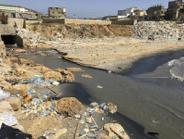Lebanon: MAIA-TAQA project to implement innovative wastewater treatment plant at the Industrial Research Institute

Lebanon, like all other developing countries, suffers greatly when it comes to pollution. Considering water pollution in specific, the lack of proper wastewater treatment is one of the major factors affecting the quality of the country’s much-needed water. The infrastructure is very old and malfunctioning and needs a lot of rehabilitation. Also, Lebanon is expected to face major water scarcity soon if the water and wastewater sector isn’t properly managed.
It was reported by the Lebanon Crisis Response Plan (LCRP) 2015-2016 that Lebanon generates an estimated 310 Mm3/year of wastewater of which 250 Mm3/year are municipal and 50 Mm3/year are industrial[1] with an estimated total Biological Oxygen Demand of about 119,348 tons[2].
35% to 50% of untreated wastewater in Lebanon gets infiltrated to aquifers and then pumped again for agricultural and domestic use because of the lack of discharge networks and effective treatment facilities. Most houses are still using septic tanks or draining wastewater into boreholes that will ultimately cause the wastewater to reach groundwater[3].
The wastewater sector in Lebanon suffers from chronic underinvestment, combined with a weak institutional and governance structure and an insufficient tariff framework. There are eight medium wastewater treatment plants (WWTPs) in Lebanon, and seventeen small plants. Therefore, wastewater treatment is almost non-existent in Lebanon with only 8% of the population actually served, while 60% of the population is connected to a sewage collection network[4]. Only one WWTP in Lebanon is generating water for irrigation.
Within MAIA TAQA project, a pilot project will consist of a construction of a Waste Water Treatment Plant for the the Industrial Research Institute (IRI) building, and the reuse of the treated water for irrigation purposes.
The proposed plant aims to fulfil the following priorities:
- Efficient system with the best quality for price ratio;
- Innovative technology for treatment, monitoring of treated water & valorisation of sludge;
- Large potential of application in local context.
This pilot action will provide an excellent opportunity for testing the technology under real life conditions and provide the infrastructure for collaboration between local Universities and MAIA-TAQA international partners.
The project is expected to be completed during fall 2021.
[1] Ministry of Energy and Water (MoEW)/ Ministry of environment (MoE) (2015/2016). Lebanon Crisis Response Plan 2015-2016
[2] World Bank. 2018. Strategic Assessment : A Capital Investment Plan For Lebanon
[3] MOE/UNDP/ECODIT. (2011). State and Trends of the Lebanese Environment. Retrieved from soer@moe.gov.lb.
[4] EBRD (2019) IPPF SIW - Lebanon Daoura/Bourj Hammoud Wastewater Treatment Plant Retrieved from http://www.ebrd.com/documents/procurement/rfc-78839.pdf







